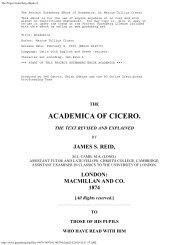From Farm House to the White House - 912 Freedom Library
From Farm House to the White House - 912 Freedom Library
From Farm House to the White House - 912 Freedom Library
You also want an ePaper? Increase the reach of your titles
YUMPU automatically turns print PDFs into web optimized ePapers that Google loves.
<strong>Farm</strong> <strong>House</strong> <strong>to</strong> <strong>the</strong> <strong>White</strong> <strong>House</strong>, by William M. Thayer 21<br />
Lawrence intended <strong>to</strong> return <strong>to</strong> England after a brief stay at home.<br />
"My record will insure me a promotion in <strong>the</strong> army," he said <strong>to</strong> his fa<strong>the</strong>r, who was averse at first <strong>to</strong> his return.<br />
"Very true; but army life is objectionable in many ways," his fa<strong>the</strong>r replied. "The honors hardly pay."<br />
"But my experience for two years has fitted me for that service more than for any o<strong>the</strong>r, and that is <strong>to</strong> be<br />
thought of," suggested Lawrence.<br />
"Yes; but o<strong>the</strong>r avenues <strong>to</strong> business are always open <strong>to</strong> young men of spirit," remarked his fa<strong>the</strong>r. "Nor is it<br />
necessary for <strong>the</strong>m <strong>to</strong> leave <strong>the</strong> country in order <strong>to</strong> accomplish a noble purpose."<br />
However, Mr. Washing<strong>to</strong>n withdrew his objections <strong>to</strong> his son's return <strong>to</strong> <strong>the</strong> army; though, subsequently, he<br />
was pleased that he abandoned <strong>the</strong> project under <strong>the</strong> following circumstances.<br />
There lived an educated English gentleman in Fairfax County by <strong>the</strong> name of William Fairfax. He had charge<br />
of a very large estate belonging <strong>to</strong> his cousin, Lord Fairfax, of England. This William Fairfax had a daughter,<br />
Anne, as well educated and accomplished as Lawrence. Mutual respect between Lawrence and Anne ripened<br />
in<strong>to</strong> mutual love, and <strong>the</strong>y became engaged. This unexpected episode in <strong>the</strong> lives of <strong>the</strong> promising couple<br />
changed <strong>the</strong> plans of Lawrence; and he voluntarily abandoned <strong>the</strong> idea of returning <strong>to</strong> <strong>the</strong> army.<br />
The martial spirit of George did not abate when Lawrence came home from <strong>the</strong> war; it ra<strong>the</strong>r increased than<br />
o<strong>the</strong>rwise. For his ears were regaled with many s<strong>to</strong>ries of army life, in which bravery, peril, bloodshed, and<br />
hairbreadth escapes were strangely mixed. There was a singular fascination in <strong>the</strong>se tales of war <strong>to</strong> George;<br />
and he never tired of listening <strong>to</strong> <strong>the</strong>m. The more he heard, <strong>the</strong> more he enjoyed playing soldier. He was<br />
constantly learning military tactics, <strong>to</strong>o, from <strong>the</strong> lips of his bro<strong>the</strong>r. Being a bright, intelligent boy, he readily<br />
comprehended and appropriated information upon a subject that was so congenial <strong>to</strong> his heart. Lawrence was<br />
impressed by <strong>the</strong> precocity of his little bro<strong>the</strong>r, as well as his tact at soldiering, so that he was all <strong>the</strong> more<br />
gratified <strong>to</strong> nurture his martial spirit by rehearsing his experience in war. Lawrence was twenty-four years of<br />
age, and George but ten, so that <strong>the</strong> latter looked up <strong>to</strong> <strong>the</strong> former somewhat as a son looks up <strong>to</strong> a fa<strong>the</strong>r,<br />
drinking in his words as words of wisdom, and accepting his experience as that of an officer of rank.<br />
Lawrence became his military teacher, really; and <strong>the</strong> opportunity <strong>to</strong> George proved a sort of West Point.<br />
Lawrence, and o<strong>the</strong>rs, <strong>to</strong>o, were very much charmed by George's manly bearing, even before he was ten years<br />
old. John Fitzhugh said of him, "He was born a man."<br />
He was very handsome, large of his age, tall and straight, graceful and dignified in his movements. These<br />
qualities were so conspicuous as <strong>to</strong> attract <strong>the</strong> attention of strangers.<br />
He was very athletic, <strong>to</strong>o, and loved more active sports than playing marbles. He excelled in running,<br />
wrestling, leaping, and throwing <strong>the</strong> bar, sports that were popular at that time. In <strong>the</strong>se things he <strong>to</strong>ok <strong>the</strong> lead.<br />
John Fitzhugh said of him, as a runner: "He ran wonderfully. We had nobody hereabouts that could come near<br />
him. There was a young Langhorn Dade, of Westmoreland, a clean-made, light young fellow, a mighty swift<br />
runner, <strong>to</strong>o--but <strong>the</strong>n he was no match for George: Langy, indeed, did not like <strong>to</strong> give it up, and would brag<br />
that he had sometimes brought George <strong>to</strong> a tie. But I believe he was mistaken; for I have seen <strong>the</strong>m run<br />
<strong>to</strong>ge<strong>the</strong>r many a time, and George always beat him easy enough."<br />
He would throw a s<strong>to</strong>ne fur<strong>the</strong>r <strong>the</strong>n any o<strong>the</strong>r boy. Col. Lewis Willis, who was one of his boon companions,<br />
said that he "had often seen George throw a s<strong>to</strong>ne across <strong>the</strong> Rappahannock, at <strong>the</strong> lower ferry of<br />
Fredericksburg." No o<strong>the</strong>r boy could do it.















